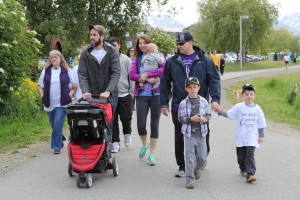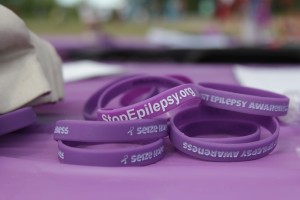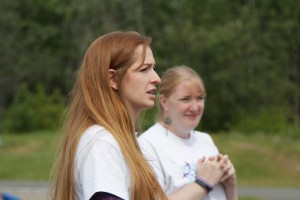It’s far from a rare disease: One in 26 people in the U.S. will be diagnosed in their lifetime. That makes it twice as common as cerebral palsy, muscular dystrophy and multiple sclerosis combined.

We’re talking about epilepsy, a broad term for disorders that cause seizures. Despite how common it is, people with epilepsy say it can be alienating.
Anchorage resident Shelby Thompson is 16 and has a rare form of epilepsy called Jeavons Syndrome. It can make normal teenage life hard.
“I’ll put my homework somewhere and I’ll have a seizure and I wouldn’t remember where it is,” said Thompson. “I kind of felt like I just stood out because I have epilepsy, and I don’t know anyone who else who does. And when I come here I know people who do have epilepsy and who can also relate to me.”
“Here” is Mary Eagan Sullivan Park on Saturday, June 4, where the Anchorage Chapter of the Epilepsy Foundation Northwest held its annual Run/Walk for Epilepsy. The event is the first of 14 that will take place across the Northwest in June, from Alaska to Oregon.

About 30 people gathered for the walk, having raised more than $6,000 to support research and an Oregon summer camp for kids with epilepsy. But more important than raising money, said attendees, was raising awareness—and offering support. Co-organizer Jenna Baldiviez said her husband Dylan started having seizures when the two of them were in their early 20s.
“We had to navigate so much, and we had no idea how to do that,” Baldiviez said. “It took years and years for us to feel like we can figure out how to live with it, how to incorporate it in our daily lives.”
She said it’s still a challenge, because even when controlled with medication, the disease is unpredictable, and so much of it isn’t well understood.
“Things happen and you don’t have an explanation, even medical professionals don’t have an explanation, and so it can be really difficult to come to terms with that,” she said. “We’re trying to progress forward and make awareness. These feelings, this experience? Normal.”
Co-organizer Alexis Lochner shared why building a community around epilepsy in Anchorage is so important to her. She’s lost three loved ones to the disease, through seizure-related deaths: Her older brother, her grandmother and her fiancé.
“I’ve just seen how it’s impacted so many different families, so many different age groups and I knew that something needed to be done here,” she said. “It helped my grieving process to put my energy into knowing I could help somebody not have to endure what I had to.”

Lochner is studying to be a nurse practitioner specializing in epilepsy treatment, and she carries cards in her wallet with first-aid tips: Don’t put anything in a seizing person’s mouth—that’s an old myth—but do roll them on their side and try to protect their head.
Lochner agreed that events like Saturday’s walk are important, because they help those with epilepsy and their loved ones feel less alone.
“After I lost my ex fiancé and I looked into it I googled and I could not find anything in Alaska for people with epilepsy,” she said. “And to see three years later us having this solid foundation to build the community on, it’s really just inspiring in itself because we’ve come a long way.”
That community means a lot to Shelby Thompson. She’s been seizure-free for seven months, but she’s going to keep speaking up.
“This is what I have and I’m going to have it for the rest of my life, and I don’t want anyone to be alarmed by it. It’s just something that I have and I’m going live with it, and I might as well tell people about it and make sure everyone’s aware.”
For more information on epilepsy and to connect to social and support groups, visit www.epilepsynw.org.




